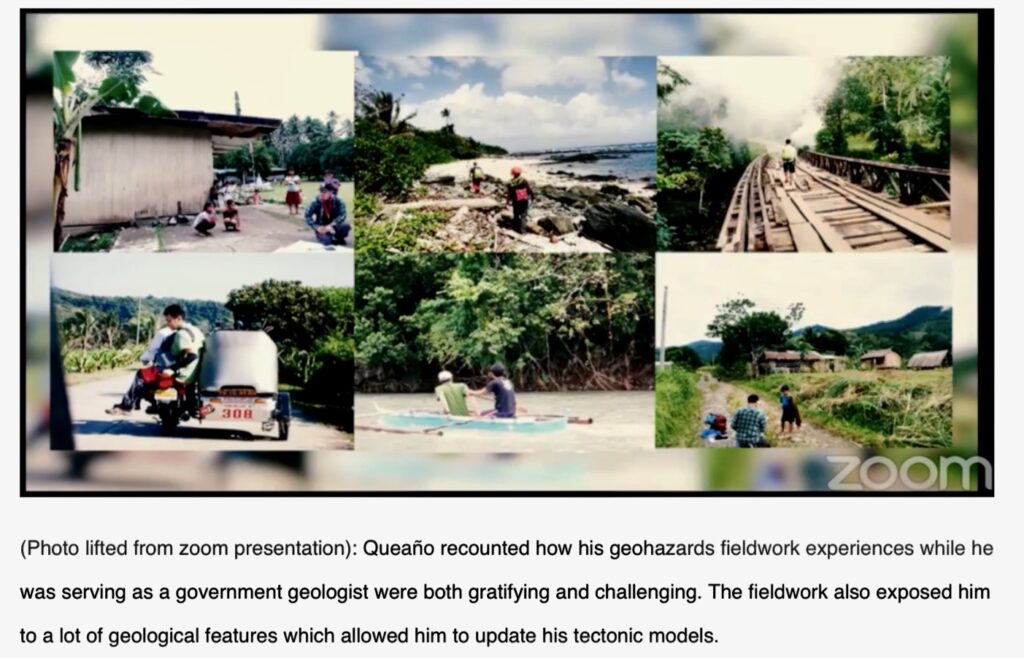Text by Geraldine Bulaon-Ducusin
Photos courtesy of S&T Media Service
“You have to be very, very convincing about the urgency of the situation. You have to be an educator for the educators who will be your partners in disseminating this information.”
This was according to Dr. Karlo L. Queaño, a geologist and Assistant Professor at the Ateneo de Manila University, who believes that Information Education and Communication (IEC) is the most vital component when doing geohazard assessment. Further, the most difficult part of the IEC is that one really has to be an excellent communicator in relaying hazard-related recommendations.
Queaño, a 2019 National Research Council of the Philippines’ (NRCP) Achievement Awardee, shared his life as a researcher during the second webisode of iShare, entitled, “On Becoming a Researcher: Looking Back and Giving Back.”
iShare is a digital storytelling platform of the Department of Science and Technology-NRCP, which aims to inspire young people through the lives of Filipinos whose careers are in the areas of science, technology, engineering, mathematics, arts, social sciences, and the humanities.
Queaño used to be one of the team leaders in the conduct of geohazards assessment and mapping throughout the country, particularly in the aspect of rain-induced landslide and flood hazards. He expressed his sentiments when he was a geologist working in government when there were occasions that their recommendations for hazard mitigation were not heeded. In some occasions, despite their efforts, government geologists were also criticized for the model or forecast that they have presented.
To address this mindset, he emphasized the need for people to understand the concept of the model. He said that when one talks about a model, it is based on assumptions and some limitations. Similarly, when one talks about forecasts, it is based on a set of data at the time the forecast was formulated.
“So, it’s not really a question of whether your model is right or wrong. It’s more of a question of whether or not your model really makes sense,” Queaño pointed out.
Being in the field of geoscience, Queaño obtained a lot of exposure not only with the various rock formations abroad but also with the living conditions of people from other cultures as well. He learned a lot about the life of Filipino domestic helpers whom he shared stories with while he was on a four-year doctoral study in Hong Kong.
The stories of the domestic helpers gave him the inspiration to think of how to translate his learnings that would impact the lives of the Filipinos – the concept of giving back. Queaño imparted that giving back is what really is expected from being an Iskolar ng Bayan.

After some years of being a public servant at the Mines and Geosciences Bureau, Queaño joined the mining industry in 2013 because he wanted to experience first-hand what the sector is really all about and what are the social, political, and environmental issues that are confronting the mining industry.
His industry experience also exposed him to life’s realities, especially poverty conditions in other countries, making him realize that many Filipinos are still fortunate despite the hardships they encounter. Because of these experiences, he knows that geologists have much to contribute to the betterment of society.
Queano expressed his gratitude to the DOST-NRCP for recognizing his contribution in the sciences and for making him a regular member. To date, he has produced at least 38 Scopus-indexed international publications. His advice to those who want to become future researchers:
“Keep your curiosity alive; find motivation in people and in your surroundings to keep you going in your research; take advantage of opportunities that can be translated into research; and more importantly, I guess, relax, enjoy, and share your blessings particularly to the most vulnerable sectors in our society.”

